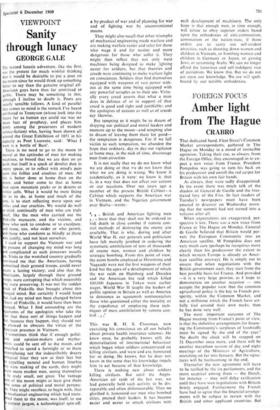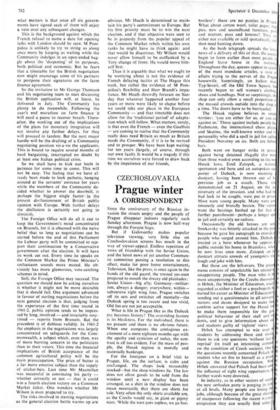FOREIGN FOCUS
Amber light from The Hague
CRABRO
That dedicated band, Fleet Street's Common Market correspondents, gathered in The Hague on Monday in a mood of invincible optimism. Taking their cue, as always, from the Foreign Office, they encouraged us to ex- pect a new voice from France. President Pompidou was going to turn his back on his predecessor and unroll the red carpet for Britain with his own fair hands.
As always, they were sadly disappointed. In the event there was much talk of the shadow of General de Gaulle and the frus- trated fury of the Five. In fact readers of Tuesday's newspapers must have been amazed to discover on Wednesday morn- ing that the summit had not turned into a volcano after all.
When expectations are exaggerated, per- spective is lost. There was a new voice from France at The Hague on Monday. General de Gaulle believed that Britain would per- vert the European Community into an American satellite. M Pompidou does not very much care (perhaps he recognises more clearly than his predecessor the extent to which western Europe is already an Amer- ican satellite anyway). He is simply out to ensure that when negotiations with the British government start, they start from the best possible basis for France. And provided —it is a very large proviso, as I hope to demonstrate on another occasion — one accepts the popular view that the common agricultural policy is the key to French pro- sperity, within the Common Market, and not a millstone which the French have art- fully tied around their own necks, then he has done very well.
The most important outcome of The Hague meeting from France's point of view, is that the definitive arrangements for financ- ing the Community's surpluses of foodstuffs must be signed `by the end of the year.' No doubt the clock will be stopped on 31 December once more, and there will be another marathon session of day,and night meetings of the Ministers of Agriculture, stretching on far into January. But the signa- tures will be forthcoming in the end.
Thereafter the new agreement will have to be ratified by the six parliaments, and the more sceptical among them — the Dutch, for instance — may well delay ratification until they have seen negotiations with Britain firmly engaged. Furthermore the French have had to agree that the financial arrange- ments will be subject to review with the British and other applicant countries. But what matters is that once all six govern- ments have signed each of them will enjoy a veto over any subsequent changes.
This is the background against which the French refusal to name a date for opening talks with London should be seen. M Pom- pidou is unlikely to try to string us along once more by keeping us waiting while the Community indulges in an open-ended hag- gle about the 'deepening' of its purposes, both political and economic. But he fears that a timetable for the British negotiation now might encourage some of his partners to postpone their signatures on the farm finance agreement.
So the invitation to Mr George Thomson and his negotiating team to start discussing the British application will, at latest, be delivered in July. The Community has plenty to do meanwhile. Following the year's end marathon on farm finance it will need a pause to recover breath. There- after, the working out of the implications of the plans for monetary integration will not involve any further delays, for they will proceed in tandem. But the next major hurdle will be the drafting of a Community negotiating position vis-a-vis the applicants. This is bound to require several months of hard bargaining, interrupted no doubt by at least one Italian political crisis.
So we shall have to kick our heels in patience for some time to come. This will not be easy. The feeling that we have al- ready been made to look pathetic, hanging around at the servants' entrance for years while the members of the Community de- cided whether to answer the doorbell, is perhaps the biggest single factor- in the present disillusionment of British public opinion with Europe. With further delays the disillusion is certainly not going to diminish.
The Foreign Office will do all it can to keep the Government's mind concentrated on Brussels, for it is obsessed with the naïve belief that so long as negotiations can be started before the end of this Parliament the Labour party will be committed to sup- port their continuation by a Conservative government after the election. It will have its work cut out. Every time he speaks on the Common Market the Prime Minister's enthusiasm sounds more muted. He ob- viously has more glamorous, vote-catching schemes in mind.
Still, the Foreign Office may succeed. The question we should now be asking ourselves is whether it might not be more desirable that it should fail. One argument advanced in favour of sterling negotiations before the next general election is that, judging from the experience of the first time round in 1961-2, public opinion tends to be impres- sed by long, involved — and invariably rosy- tinted — reports from Brussels. But the precedent is of dubious validity. In 1961-2 the emphasis in the negotiations was largely concentrated on safeguards for the Com- monwealth, a subject which, even then, was of more burning concern to the politicians than to their voters. This time the financial implications of British acceptance of the common agricultural policy will be the main preoccupation. The price of butter is a far more emotive subject than the supply of cricket-bats. Last time Mr Macmillan was successful in convincing his party whether correctly or not — that it could win a fourth election victory on a Common Market ticket. One wonders whether Mr Wilson is even prepared to try.
The risks involved in starting negotiations as the general election battle warms up are
obvious. Mr Heath is determined to main- tain his party's commitment to Europe. But his first priority must be to win the next election, and if that objective were seen to be in jeopardy from the popular appeal of the Common Market rebels within his own ranks he might have to think again: and that would be disastrous. Mr Wilson would never allow himself to be outflanked by a Tory change of front. He would move him, self first.
Thus it is arguable that what we ought to be worrying about is not the evidence of French delaying tactics at The Hague this week, but rather the evidence of M Pom- pidou's flexibility and Herr Brandt's impa- tience. Mr Heath shrewdly forecast on Sun- day that whatever happened another four years or more were likely to elapse before we could take our place in the European Community — and that timetable does not allow for the 'traditional period' of adapta tion which will follow. What matters, surely, is that even the French — even the Gaullists — are coming to realise that the Community really does need Britain as much as Britain needs the Community, if it is to be revived and to prosper. We have been kept waiting for ten years (largely, of course, through our own fault). It would be a tragedy if this time we ourselves were forced to draw back by the impatience of our friends,







































 Previous page
Previous page